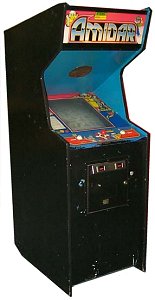 The Game: I’ll try to explain this as best I can. You’re a paintroller (recent escapee from Make Trax?) beseiged by pigs. Or a gorilla pursued by natives. Or something like that. It depends on which level you’re playing. You must try to enclose as many of the spaces in the game area as possible, in a zig-zagging pattern. This, the attract mode wisely advises us, is “Amidar movement.” You have one way to avoid an imminent head-on collision – you can hit the jump button, which doesn’t make you jump, but forces everything else on the board to jump. Enclosing all of the available spaces advances you to the next level, with different animal enemies. (Stern [under license from Konami], 1982)
The Game: I’ll try to explain this as best I can. You’re a paintroller (recent escapee from Make Trax?) beseiged by pigs. Or a gorilla pursued by natives. Or something like that. It depends on which level you’re playing. You must try to enclose as many of the spaces in the game area as possible, in a zig-zagging pattern. This, the attract mode wisely advises us, is “Amidar movement.” You have one way to avoid an imminent head-on collision – you can hit the jump button, which doesn’t make you jump, but forces everything else on the board to jump. Enclosing all of the available spaces advances you to the next level, with different animal enemies. (Stern [under license from Konami], 1982)
Memories: My God. Who programmed this game, and what were they smoking? I mean, okay, the enclosing-of-spaces thing is nothing new – look at Qix. But paintrollers versus pigs? Gorillas versus nasty natives? Oh well. I suppose it makes about as much sense as Exidy’s very similar Pepper II, of which more another time.
 So perhaps, with so abstract and unfathomable a premise, it’s no surprise that Amidar – at a time when cutesy animal games such as Kangaroo and Pengo were raking in quarters – has been relegated to almost total obscurity. Face it. Be honest. When was the last time you remembered or thought of Amidar before you read this?
So perhaps, with so abstract and unfathomable a premise, it’s no surprise that Amidar – at a time when cutesy animal games such as Kangaroo and Pengo were raking in quarters – has been relegated to almost total obscurity. Face it. Be honest. When was the last time you remembered or thought of Amidar before you read this?
I suppose all of that is academic, and largely my opinion anyway. Was Amidar fun? Well, I guess. The zig-zagging action demanded of your on-screen persona always seemed outlandishly arbitrary to me. In that sense, Pepper II‘s use of zippers which could be opened or closed to enclose an area was actually more logical, if still rather bizarre.
Parker Brothers grabbed the home video game rights to Amidar, and their Atari 2600 version further muddied the waters of “what is this game about?” by reducing the paintrollers, pigs, gorillas and so forth down to pixellated blobs.
Actually, that almost makes more sense.
 Amidar survives to this day through MAME, but has been ignored by the glut of arcade emulation collections for home consoles, including Konami’s own recent Playstation compilation which featured such contemporary titles as Pooyan and Time Pilot.
Amidar survives to this day through MAME, but has been ignored by the glut of arcade emulation collections for home consoles, including Konami’s own recent Playstation compilation which featured such contemporary titles as Pooyan and Time Pilot.